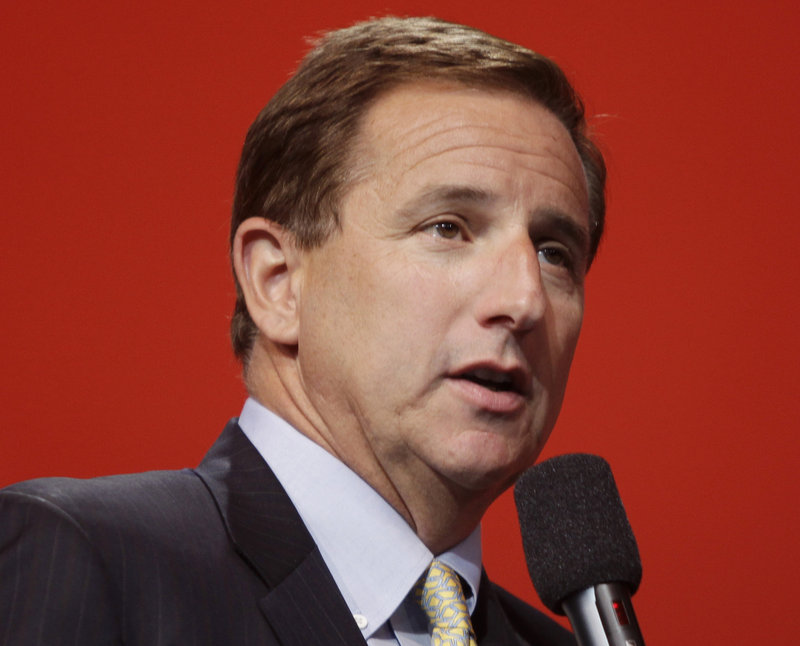SAN FRANCISCO – A federal investigation into Mark Hurd’s hasty resignation as Hewlett-Packard Co.’s CEO touches on some of the biggest names in technology.
Yet the potential damage to Hurd, HP or his current employer, Oracle Corp., is likely limited, legal experts say, because the allegations against him are narrow and their underlying facts are murky.
Hurd’s biggest headache in the Securities and Exchange Commission’s probe, which was revealed this week, likely won’t be the allegations of sexual harassment or the findings of inaccurate expense reports that got him ousted from HP in August.
Potentially more problematic is an allegation by Hurd’s accuser, a former HP marketing contractor named Jodie Fisher, that Hurd tipped her off in advance about HP’s plans to buy technology services company Electronic Data Systems for $13.9 billion in 2008.
Fisher later appeared to recant her statement, and there are some protections for revealing inside information to family members and other close confidantes if they don’t trade on the information. Still, the SEC could sanction Hurd if it determines that he made a material disclosure and that Fisher didn’t fall into a protected category.
“Tipping a takeover target is an original sin in the eyes of the SEC,” said John Coffee Jr., a professor at Columbia Law School and an expert on securities regulation. “While there’s no evidence that she traded on it, or that he was telling her to induce her to trade, it nonetheless violates the norms.”
It’s all right for executives to share secrets with some outside parties, such as spouses or close friends, if there’s an established pattern of sharing confidential information with them. But Coffee said a one-time disclosure to someone without a legitimate need to know might get Hurd into trouble.
Coffee said he doesn’t believe that Oracle, which hired Hurd as a co-president one month after his ouster from HP, is at risk in the SEC investigation. Investigators also aren’t likely to focus on HP for the way it disclosed Hurd’s exit, he said.
“I don’t know that they have any business worrying about whether the board was too quick or too slow in a case involving somewhat gray and disputed allegations of sexual harassment,” Coffee said.
HP, which says it is cooperating with the SEC investigation, has never publicly disclosed Fisher’s allegation about the acquisition tip. In announcing Hurd’s resignation, the world’s biggest technology company said that although it found no evidence of sexual harassment, it found inaccurate expense reports for some of Hurd’s private outings with Fisher.
Hurd argues that he didn’t prepare his own expenses and that Fisher’s name was inadvertently left off some reports, but included on others.
The Wall Street Journal reported that the SEC is looking at the possibility that Hurd destroyed computer evidence related to the case.
A person familiar with the case said Hurd cleared his computer before he returned it to HP, to protect the privacy of relatives who sometimes used the machine. That person spoke on condition of anonymity because the person was not authorized to speak publicly about the details.
Fisher helped organize and host HP networking events that Hurd would attend. She accused Hurd, a married father of two, of harassment after her work dried up. She blamed the reduction on her rebuffing his advances, a charge Hurd denies.
The SEC and Oracle declined to comment. Hurd acted properly “in all respects,” Hurd spokesman David Satterfield has said.
SEC investigations are common after surprising, market-moving events. Often, any violations found are settled, sometimes without a fine.
HP is facing lawsuits over the handling of Hurd’s resignation, in particular because some $9 billion in its market value evaporated in the first trading day after the announcement of Hurd’s departure.
Shares haven’t fully recovered despite the fact that investors have generally been pleased by comments from Hurd’s replacement, Leo Apotheker, the former CEO of software maker SAP AG. Apotheker has rescinded employee pay cuts imposed under Hurd and vowed to close gaps with rival IBM Corp. in software and research.
HP has also been criticized for the size of Hurd’s severance package. He got a $12.2 million cash payout and has filed papers to sell some $30 million worth of stock that he got by exercising options that were part of his severance.
Send questions/comments to the editors.




Success. Please wait for the page to reload. If the page does not reload within 5 seconds, please refresh the page.
Enter your email and password to access comments.
Hi, to comment on stories you must . This profile is in addition to your subscription and website login.
Already have a commenting profile? .
Invalid username/password.
Please check your email to confirm and complete your registration.
Only subscribers are eligible to post comments. Please subscribe or login first for digital access. Here’s why.
Use the form below to reset your password. When you've submitted your account email, we will send an email with a reset code.